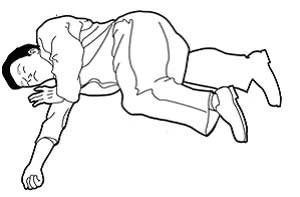Back to the Beepedia Index...
Bee Stings
Bee stings are a hazard of being a bee-keeper. Some
keepers think it is good for you and operate without gloves, itís believed you
become immune and the bee venom can be helpful towards certain ailments. This
is obviously personal choice, but if you get stung it kills the bee as it
rips off the rear of the abdomen of the beeís body.
Attached to the sting is a
muscle, the bee flies off leaving the poison sack and muscle attached to the
victim. The muscle continues to pump venom into its victim. The best way to
remove the sting is NOT to pinch it with finger and thumb, this squeezes all
the poison in the venom sack into the victim. Instead scratch the sting out
with a fingernail or sharp implement as soon as possible. The sting sack gives
off an odour, this attracts other bees that think the bee is in danger.

The anatomy of a honeybee
If a bee gets caught up in your hair it will
most probably end up stinging you because it will panic as it gets entangled and
unable to get out. The best method if this happens is to slap it and squash it
against your head quickly before it stings. This does not always work and could
result in you getting stung anyway, but it is apparently the most efficient way.
If you have been stung and the sting has been removed,
quickly use a bee sting antidote. This just helps to alleviate the pain and reduce
the swelling a little. A cold compress is also very good for reducing swelling.
Some people may be susceptible to
Anaphylactic Shock from stings. If they show signs and symptoms of shock, like
light headiness, difficulty breathing and general distress, call for medical assistance
immediately. It is also advantageous to place them in the
recovery position and ensure their airway is clear.

The recovery position
Back to the Beepedia Index...
The information presented is not to be construed as medical advice. All medical ailments should be discussed with a fully trained and certified professional.
The content of this page is to be used entirely at your own risk.
|